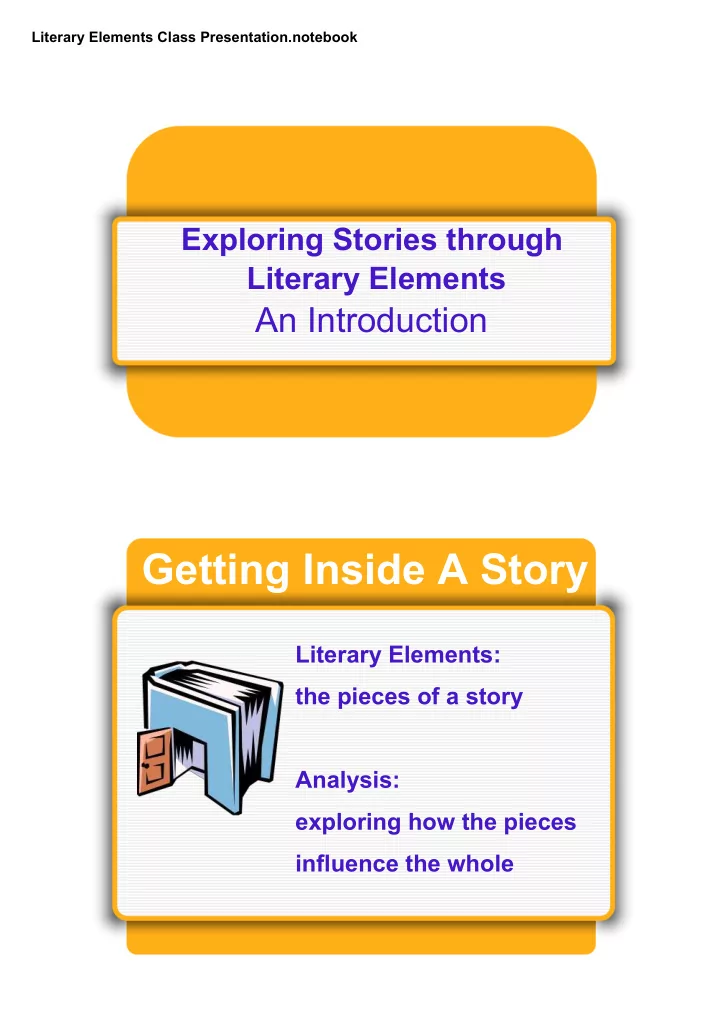

Literary Elements Class Presentation.notebook Exploring Stories through Literary Elements An Introduction Getting Inside A Story Literary Elements: the pieces of a story Analysis: exploring how the pieces influence the whole
Literary Elements Class Presentation.notebook The Pieces of a Story Notes Story
Literary Elements Class Presentation.notebook Analyzing the Story Follow a literary element through the story and identify how it influences the whole story and the other literary elements. Setting PARTS OF SETTING Time/Historical Period Geographic Location Physical Features Social Setting
Literary Elements Class Presentation.notebook Conflict INTERNAL The conflict is between the character and himself. Characters can struggle with decisions or emotions. EXTERNAL The conflict is between a character and an opposing force. This can be another character, society, nature, technology, the supernatural, etc. Winnie the Pooh MAJOR CONFLICT: The weather destroys Owl’s house. Story ends when Eeyore finds new one. MINOR CONFLICTS: Piglet blows away. Tigger scares Pooh. Rain floods woods and houses.
Literary Elements Class Presentation.notebook How does conflict work? • Conflict drives plot • MAJOR CONFLICT • story continues until conflict is solved • MINOR CONFLICT • complicates the current conflict • helps reveal theme based on what happens and why • helps reader learn about characters based on how they react Resolving the Conflict
Literary Elements Class Presentation.notebook And Every Now and Then… Luck, Characters Change, Divine Interventions Occur Notes
Literary Elements Class Presentation.notebook What Conflict Shows Us • CHARACTERIZATION • How do the characters react to the conflict? What does this tell us about them? • THEME • What happens to the characters? Why does it happen? How is the conflict solved? WHAT DOES THIS SUGGEST ABOUT PEOPLE and LIFE? Conflict and Character
Literary Elements Class Presentation.notebook Conflict and Theme Notes
Literary Elements Class Presentation.notebook Setting PARTS OF SETTING Time/Historical Period Geographic Location Physical Features Social Setting Notes
Literary Elements Class Presentation.notebook The Influence of Setting Setting can influence: • Our understanding of characters (culture, customs) • The conflict • How we picture the action (imagery) Notes
Literary Elements Class Presentation.notebook Character • Characters influence... • PLOT and CONFLICT • Characterization • Character Motivations • Role of Minor Characters Characters influence THEME • Cause and Effect • Dynamic and Static Characters The Character Connection
Literary Elements Class Presentation.notebook Notes The Role of Minor Characters Create complications Help solve the conflict Develop theme Help develop main characters
Literary Elements Class Presentation.notebook Can Stories Talk? • Does the story present life as positive or negative? • Does the story present people as good, evil or both? • What does the story suggest about how people should live their lives? • According to the story, do people have control of their own lives? • What kind of society does the story depict? • What influences the condition of this society? • Does the story address any values: loyalty, tolerance, hard work, etc.? • Does the story focus on any universal experiences such as growing up, falling n love, etc.? • THE ANSWERS TO THESE QUESTIONS POINT TO THE THEME OF THE STORY. Any questions?
Literary Elements Class Presentation.notebook
Recommend
More recommend